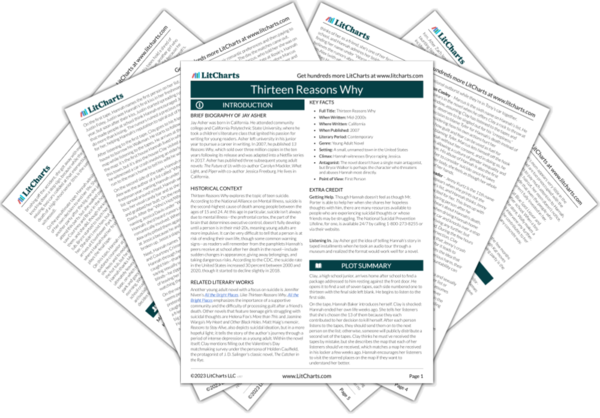Thirteen Reasons Why suggests that when men take advantage of women, feeling that they’re entitled to view, touch, and judge women’s bodies without their permission, they help to maintain an environment of gender inequality that disempowers and distresses women. When Justin spreads the rumor that Hannah let him touch her sexually (when the truth is that they only kissed), not only does everyone believe Justin instead of Hannah, but it’s Hannah, not Justin, who faces mockery and judgment for what (according to Justin) happened between them. Similarly, Alex’s “Who’s Hot/Who’s Not” list allows people to objectify and ridicule the female students included on the list—while Alex suffers no consequences for including them on the list and objectifying them without their consent.
Though the novel’s male characters often suggest, encourage, and control these sexualized situations, they face relatively few repercussions, either emotionally or practically. For example, when a boy grabs Hannah’s wrist to stop her from leaving Blue Spot Liquor—then tells her to relax, claiming that he’s “just playing”—he simultaneously touches her against her will and invalidates her perfectly justified feelings of panic and powerlessness. As a result, in addition to feeling physically trapped, Hannah is also unable to take control of her emotional reality. Furthermore, Hannah doesn’t bother to name Bryce, the boy who she knows raped Jessica at a party, on her tapes, because she knows he would try to bury the story—and would probably succeed in doing so. So when it comes to Bryce’s sexual advances on Hannah, she feels both physically and emotionally disempowered—she allows him to touch and have sex with her without verbally consenting. That decision echoes her decision to almost completely give up on her own life. This sense of powerlessness illustrates that her inability to fight back against unfair treatment she’s dealt—mostly because of her gender—leads Hannah to believe that her life is utterly out of her control. The novel therefore demonstrates that society with a foundation of gender inequality can lead to situations of intense emotional and physical harm, leaving women feeling desperately disempowered.
Gender, Sexualization, and Agency ThemeTracker

Gender, Sexualization, and Agency Quotes in Thirteen Reasons Why
I knocked his hand away with a quick backhand swipe that every girl should master. And that’s when Wally emerged from his shell. That’s when Wally made a sound. His mouth stayed shut, and it was nothing more than a quick click of the tongue, but that little noise took me by surprise. Inside, I knew, Wally was a ball of rage.
I’ve had my butt grabbed before—no big deal—but this time it was grabbed because someone else wrote my name on a list. And when this guy saw me upset, did he apologize? No. Instead, he got aggressive. Then, in the most condescending way, he told me to relax. Then he put his hand on my shoulder, as if by touching me he’d somehow comfort me.
After your visits, I twisted my blinds shut every night. I locked out the stars and I never saw lightning again. Each night, I simply turned out the lights and went to bed.
If you ever caught me reading one of those teen magazines, I swear, it wasn’t for the makeup tips. It was for the surveys.
Because you never wore makeup, Hannah. You didn’t need it.
Fine, some of the hair and makeup tips were helpful.
You wore makeup?
The bedroom door opened again. But again, you pulled it shut. And you tried to make a joke of it. “Trust me,” you said, “she won’t move. She’ll just lay there.”
And what was his response? What was it? What was his reasoning for you to step aside and let him in that room? Do you remember? Because I do.
It was the night shift.
He told you he was working the night shift and had to leave in a few minutes.
A few minutes, that’s all he needed with her. So just relax and step aside.
And that’s all it took for you to let him open the door.
Just two more to go. Don’t give up on me now.
I’m sorry. I guess that’s an odd thing to say. Because isn’t that what I’m doing? Giving up?
Yes. As a matter of fact, I am. And that, more than anything else, is what this all comes down to. Me… giving up… on me.
No matter what I’ve said so far, no matter who I’ve spoken of, it all comes back to—it all ends with—me.











